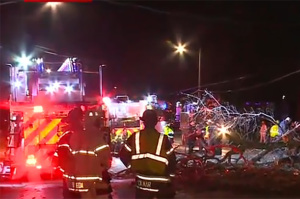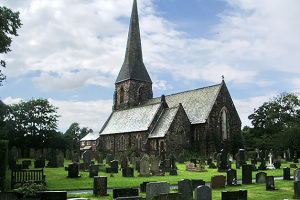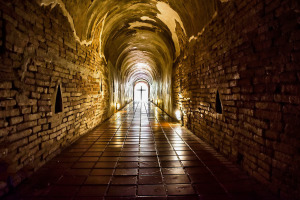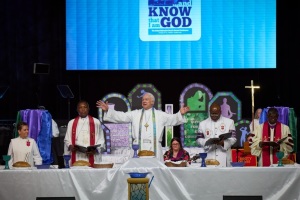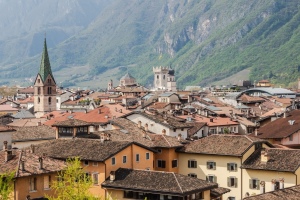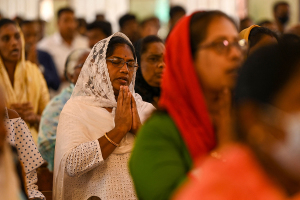Where is God in this Mess?
On January 12th the nation of Haiti was devastated by an earthquake the magnitude of 7.0, the largest earthquake on that besieged island state in 200 years. The next morning we received a personal note from a Haitian Episcopal priest from Port-Au- Prince:
"There is no Cathedral. The entire Holy Trinity complex is gone. The convent for the Sisters of St. Margaret is gone. The Bishop's house is gone. College St. Pierre is gone. In Grand Colline, the church is gone. In St. Martin of Tours, the kindergarten is gone. In St. Etienne Buteau the church, the rectory and the school are gone."
The worst was still to be reported the next morning as we all sat dazed looking at our television screens watching images of utter devastation. Over two million are without food, shelter and water. No place to bury hundreds of dead. An American survivor wrote on Twitter: "Piles of cadavers were burned today. Only other option was to let them rot. I have soot on me. That soot contains human DNA. God help us." The horrible irony is that Haiti has already suffered greatly as it is the poorest country in the western hemisphere. For century's Haitians have endured injustice and oppression and now is in the middle of unspeakable destruction of what little they have left. I hear songs of Lament in the air:
O my God, I cry out by day, but you do not answer,
by night, and am not silent. (Psalm: 22:2)
I cry out to you, oh God, but you do not answer. (Job 30:20)
…my foes taunt,
saying to me all day long,
"Where is your God?" (Psalm 42:10)
And we join our Haitian brothers and sisters in lament to cry out: "Where is God in this Mess?"
There is so much suffering in the world. Massive earthquakes in Haiti, persecution in Pakistan, the cataclysmic Tsunamis, Hurricane Katrina and the 9-11 terrorism all stir up a storm of profound questions about the presence of God in the affairs of our human family. Even the Freedom from Religion Foundation has asked "How can typical Christians reconcile their belief that their god is all good and all powerful with the heartbreaking scenes of devastation being telecast…?" I was struck this week by Rev. Pat Robertson's comments as he appeared to assign blame to the Haitian people's pact with the devil made by the founders who wanted the country to be free from French control. Similarly, at the time of our crisis from Hurricane Katrina, Minister Louis Farrakhan of the Nation of Islam called it a judgment on the United States for the Iraq war. In such a time of human tragedy it is not for us to put blame on God or for the sins of humanity. It is a time for each of us to put personal judgments aside and focus that energy toward support of the victims of the tragedy in Haiti and ask what we can do to help.
Elie Wiesel, Holocaust survivor, and winner of a Nobel Prize for peace, once was asked, "Mr. Wiesel, to what degree would you be willing to acknowledge that the suffering that we have experienced as Jews, in all the calamities of our history and including the Holocaust, are the fulfillment of God's judgments forewarned prophetically in the concluding chapters of the books of Leviticus and Deuteronomy?" After stunned silence, he answered: "I refuse to consider that." I, too, refuse to consider that recent calamities are punishment from God. I believe in a loving God and to Him we pray for mercy on our world.
It is only natural in times of crisis to ask "Where is God?" Though many scholars have tried smart answers and pious reasoning, both of these approaches seem hollow and shallow. But, as Christians we learn from the lives of other saints. In times of spiritual aridity, of darkness and blankness, we must not stop praying, otherwise how would we know when God's presence becomes alive in our lives again? I prefer to learn from the life of Jesus: Jesus on the Cross bearing the burden of the sins of humanity facing utmost pain called out: "My God, my God, why have you forsaken me and are so far from my cry and from the words of my distress?" (Psalm 22:1). The plain truth of the Gospel is that our God has not abandoned us in times of crisis. He is present when his people go through the wilderness, not just in the Promised Land. Through rough times we learn a different level of faith, one that does not remove the difficulty but, nevertheless, withstands; this is a fidelity in which weakness transforms into strength and prayers for healing melt into prayers of acceptance.[1]
As I wrestle with this question myself I speak with humility, knowing the limits of my understanding. I won't pretend to have a fully adequate response. The problem of pain and suffering has vexed humanity since the beginning. If there is a God, and if He is a good and loving God, why does He allow His creation to suffer? If God is all powerful, then why didn't He stop this earthquake in Haiti? After the Asian tsunami, even the Archbishop of Canterbury was humbled to say, "Of course, this makes us doubt God's existence."
According to Christian and Jewish theology, something went very wrong when human history began. Pain and suffering were not in the original plan for creation. God created a perfect world; but sinful, disobedient humans spoil, destroy and disturb the harmony and ecology of natural order. The stench of poverty in Haiti is the result of centuries of human greed and the oppression of common people. The tragedy of Katrina was that the city of New Orleans was built on wetlands below sea level. These were the actions of man - not God's plan. There are so many situations in which we find that such human tragedies are neither explainable nor understandable. In the Biblical creation story our ancestors rejected God and rebelled against His wish to keep everything in harmony. As Christians we cannot isolate the problem of natural evil from the biblical story of sin and redemption. God didn't wind the mechanical clock of creation as a distant observer. The dynamic God of the Bible is a Savior, not a mechanic. And, through the incarnation of His Son, the God we worship participates in the daily affairs of humanity.
God in the person of Jesus Christ is full of mercy. Jesus' victory on the cross over death and sin is an all-out attack on evil in all its manifestations. God sent His Son that human beings may not perish but may come to know that in all circumstances He offers saving grace. His Spirit from the beginning of the creation hovered over the waters and God is still our Faithful Companion offering us Shalom, Shanti and Salaam in the midst of our struggle and despair. Jesus said, "Do not let your hearts be troubled. Believe in God, believe in me" (John 14:1).
Through our faith we know natural disaster and human sin are part of the interim between the fall that corrupted God's very good creation and the glorious goal toward which history is moving. God is not only the Creator and Sustainer of the world, He is the Savior, the one who has put it right and continues to put it right. God's ultimate goal is the rebirth of the entire creation. God saw the enormity of the problem so He sent His own Son to give His life for us. Natural disasters remind us that it is not just people, but the whole creation that has became sick unto death and is being renewed unto life. Paul writes of this, "groaning as in the pain of childbirth" (Romans 8:22). No matter how unbearable it may seem, it is now that we must know that in Christ we have a place in the larger picture of the world's birth and renewal. "All creation is waiting eagerly for that future day when God will reveal who His children really are…{And} all creation anticipates the day when it will join God's children in glorious freedom from death and decay" (Rom.8:19,21). Christ's arms on the hard wood of the cross are open to all. Therefore, following His example, we must embrace the suffering world and offer it hope. I ask for Christians all over the world to offer prayers, to give generously and to work as volunteers to relieve the suffering of our brothers and sisters in their time of need.
















